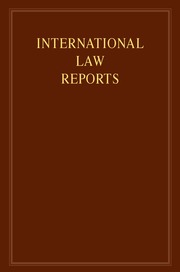No CrossRef data available.
Article contents
application For Review Of Judgment No. 273 Of The United Nations Administrative Tribunal (mortished Case)
Published online by Cambridge University Press: 01 January 2021
Abstract
The individual in international law — In general — Before international tribunals — International Court of Justice — Review of judgment closely affecting individuals — Individuals unable to appear as parties before the Court — Whether compatible with principle of equality of parties
International organization and administration — The United Nations — The General Assembly — Resolution 34/165 — Whether to be given immediate effect — Retroactive application of resolution — Relation between resolutions, Staff Regulations and Staff Ru1es — United Nations Charter, 1945, Article 101
Disputes — International Court of Justice — Advisory jurisdiction — Competence — Committee on Applications for Review of Administrative Tribunal judgments — Application made by Member State — Whether constituting an intervention by a person not party to original proceedings — Effect on authority of United Nations Secretary-General — Propriety of giving opinion — Nature and scope of opinion requested — Extent of review of merits of Tribunal’s judgment — Equality of parties before Court — Whether principle applicable to Committee — Procedural irregularities in proceedings before Committee — Whether ‘compelling reasons’ to decline to give opinion — Prima facie duty of Court not to refuse participation in activities of the United Nations — Formulation of question in request — Whether Court entitled to determine meaning and implications of question — Whether Court entitled to reformulate request
Disputes — International Court of Justice — Advisory jurisdiction — Procedure — Review of judgments of the United Nations Administrative Tribunal — Effect of individuals being involved in original proceedings — Equality of parties before the Court — Whether correct to dispense with otal hearings
International organization and administration — International officials — The United Nations — United Nations Administrative Tribunal — Repatriation grant payable to retiring United Nations officials — Whether entitlement dependent on providing evidence of relocation — Review of judgment of Tribunal — Whether Tribunal erred on a question of law relating to provisions of Charter of the United Nations, 1945 — Staff Rules and Regulations — Whether conferring acquired rights — General Assembly Resolution 34/165 — Retroactive application — Article 101 of the Charter — Whether contradicted by Tribunal’s interpretation of Staff Rules and Regulations — Whether Tribunal exceeded jurisdiction or competence — Jurisdiction defined in Statute of Tribunal
Disputes — International Court of Justice — Advisory jurisdiction — Competence — Committee on Applications for Review of Administrative Tribunal judgments — Application made by Member State — Whether constituting an intervention by a person not party to original proceedings — Effect on authority of United Nations Secretary-General — Propriety of giving opinion — Nature and scope of opinion requested — Extent of review of merits of Tribunal’s judgment — Equality of parties before the Court — Whether principle applicable to Committee — Procedural irregularities in proceedings before Committee — Whether ‘compelling reasons’ to decline to give opinion — Prima facie duty of Court not to refuse participation in activities of United Nations — Formulation of question in request — Whether Court entitled to determine meaning and implications of question — Whether Court entitled to reformulate request — Procedure — Individuals closely affected by review unable to appear as parties before Court — Whether correct to dispense with oral hearing
- Type
- Case Report
- Information
- Copyright
- © Cambridge University Press 1985


